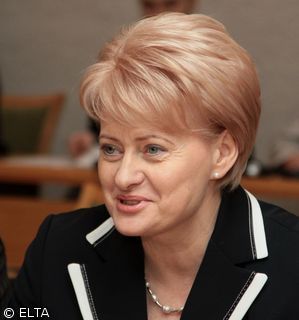LANGUAGE COPS, PARTIES CLASH OVER CAMPAIGN ADS.
Published:
29 September 1999 y., Wednesday
Estoniais language board ordered a Tallinn tram fleet to remove a political advertisement printed in both Estonian and Russian from the exterior of a tram car.The ad, the language board said, violates an election law that requires outside advertising to be printed in Estonian and only Estonian. The ad was placed by the Peopleis Trust, an electoral alliance that comprises several of Estoniais Russian parties. After the tram fleet removed the advertisement, the Peopleis Trust submitted a formal complaint against the language board to the Tallinn Administrative Court. The Estonian language law specifies that "public signs, announcements and advertisements shall be in Estonian." The National Language Board, which is charged with interpreting and enforcing the law, has interpreted this to mean "only in Estonian," excluding the possibility for translations into other languages. Urmas Veikat, assistant to the director of the National Language Board, insists that the wording of the law is quite clear on this point."If the law did allow bilingual signs, then the wording would be ein Estonian and in other languages. As it stands, only Estonian-language signs are allowed. This comes directly from paragraph 6 of the Estonian constitution, which declares Estonian the state language." Representatives of the Peopleis Trust claimed in a public statement Sept.20 that the current interpretation of the law deprives non-Estonian speakers of their right to information. Unlike in parliamentary elections, anyone with an Estonian residence permit has the right to vote in local elections. This includes approximately 300,000 Russian speakers in Estonia. Three Russian electoral unions - groups of parties who present a common list of candidates - are participating in the elections. The issue of Russian-language political advertisements arose during the parliamentary campaign last spring, when the language board ordered the Russian Party in Estonia to remove Russian-language posters. Other printed campaign materials, such as brochures and newspaper ads, may be in any language. The ban on foreign language use also does not include proper names or registered trademarks. The law holds the publisher of the advertisement, in this case the Tallinn tram fleet, responsible for not following the law.
Written by Tricia Cornell
Copying, publishing, announcing any information from the News.lt portal without written permission of News.lt editorial office is prohibited.
The most popular articles
 You can now access books, journals, films, maps etc from across Europe via the EU's online library, Europeana.
more »
You can now access books, journals, films, maps etc from across Europe via the EU's online library, Europeana.
more »
 Late night chat turned serious when comedian David Letterman admitted he had sex with female employees and was being blackmailed for $2-million (USD) over the affairs.
more »
Late night chat turned serious when comedian David Letterman admitted he had sex with female employees and was being blackmailed for $2-million (USD) over the affairs.
more »
 Last Thursday (1 October) saw an agreement that will lead to the introduction of more efficient tyres for cars and lorries that will cut fuel bills and CO2 emissions.
more »
Last Thursday (1 October) saw an agreement that will lead to the introduction of more efficient tyres for cars and lorries that will cut fuel bills and CO2 emissions.
more »
 The European Job Days are taking place around the EU over the next fortnight, with a centrepiece event in Brussels on 3 October.
more »
The European Job Days are taking place around the EU over the next fortnight, with a centrepiece event in Brussels on 3 October.
more »
 Women, especially migrant and/or poor women, have been harder hit by the financial crisis than men, MEPs heard on Wednesday.
more »
Women, especially migrant and/or poor women, have been harder hit by the financial crisis than men, MEPs heard on Wednesday.
more »
 New EU plan to make local transport efficient and sustainable.
more »
New EU plan to make local transport efficient and sustainable.
more »
 Hollywood heavyweights and European cultural figures are rallying behind jailed film director Roman Polanski.
more »
Hollywood heavyweights and European cultural figures are rallying behind jailed film director Roman Polanski.
more »
 By the time of his death in the Moscow winter 20 years ago, Andrei Sakharov had built an international reputation as a nuclear physicist, human rights activist and Nobel Peace Prize winner His fears over the implications of his work led him to call for peaceful coexistence and later for human rights in the USSR.
more »
By the time of his death in the Moscow winter 20 years ago, Andrei Sakharov had built an international reputation as a nuclear physicist, human rights activist and Nobel Peace Prize winner His fears over the implications of his work led him to call for peaceful coexistence and later for human rights in the USSR.
more »
 The ten nominations for this year's Sakharov Prize, the EP's prize for defenders of human rights and democracy, have now been put forward and will be officially presented at the end of the month.
more »
The ten nominations for this year's Sakharov Prize, the EP's prize for defenders of human rights and democracy, have now been put forward and will be officially presented at the end of the month.
more »
 President of the Republic of Lithuania Dalia Grybauskaitė attended a meeting hosted by the President of Liberia Ellen Johnson-Sirleaf and the President of Finland Tarja Halonen on Peace and Security through Women's Leadership.
more »
President of the Republic of Lithuania Dalia Grybauskaitė attended a meeting hosted by the President of Liberia Ellen Johnson-Sirleaf and the President of Finland Tarja Halonen on Peace and Security through Women's Leadership.
more »